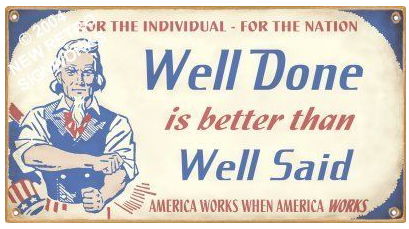The dispiriting of workers forced to work in dead end, temporary jobs without any future, has led some writers to claim a decline in the work ethic, but what is really happening is that these workers are unable to express their work ethic in such jobs without feeling exploited.
 In particular, the 1990s generation of new job seekers—variously referred to as Slackers, Twentysomethings, or Generation X—have been accused of having no work ethic and being lazy. For example, a 1996 Christian Broadcasting Network programme was introduced “If you think service has gotten worse and then worse in America, you’re probably right. Increasing numbers of employees and managers say the problem is today’s young worker, Generation X’ers who just don’t have a strong work ethic.” The expert interviewed for the program, a consultant for fast-food chains, said that these young people were “selfish, get bored easily, and don’t know the meaning of loyalty and commitment.... Our generation, my generation, was a generation that looked upon work as the be all, end all. This generation, for them, its just a means to an end, to their free time, their leisure, and their money to have fun.”
In particular, the 1990s generation of new job seekers—variously referred to as Slackers, Twentysomethings, or Generation X—have been accused of having no work ethic and being lazy. For example, a 1996 Christian Broadcasting Network programme was introduced “If you think service has gotten worse and then worse in America, you’re probably right. Increasing numbers of employees and managers say the problem is today’s young worker, Generation X’ers who just don’t have a strong work ethic.” The expert interviewed for the program, a consultant for fast-food chains, said that these young people were “selfish, get bored easily, and don’t know the meaning of loyalty and commitment.... Our generation, my generation, was a generation that looked upon work as the be all, end all. This generation, for them, its just a means to an end, to their free time, their leisure, and their money to have fun.”
However research does not seem to back up these perceptions that young people have less work ethic than previous generations. Surveys by both the Roper Center for Public Opinion Research and the Gallup organisation have found that the work ethic is just as important for younger people as for older generations.
Bob Filipczak, a self-proclaimed member of Generation X, suggests that they seem to have a different attitude to work because most positions available to them have no future, they are “McJobs”, that is “temporary, dead-end jobs in the service sector.” Young people feel no loyalty to employers in such jobs and tend to job hop. It also means they don’t look to work for their fulfilment and do not willingly work  overtime:
overtime:
Why put in lots of overtime and bust butt for a McJob? If even well-paid, challenging work is seen as a temporary assignment, its hard to argue that young workers should go the extra mile in the name of future promotions or job security that most companies can’t deliver.
Young people still feel the need to give their best but are not doing so because they do not feel they will be the beneficiaries of their work because of the structure of the societal reward system that sees fewer benefits of increased productivity going to workers.
 It is the perceived decline in work ethic, particularly amonst the young, and demoralisation of older workers, that has prompted a resurgence in advocacy of the work ethic in recent years. President Clinton named the work ethic as one of the traits that need national encouragement. In this he was in agreement with speaker of the House, Newt Gingrich, who listed the work ethic as one of the key factors “at the heart of the successes we Americans have had as a people.” Jesse Jackson promoted the work ethic as an essential character trait that blacks needed to adopt if they are to achieve equality with whites.
It is the perceived decline in work ethic, particularly amonst the young, and demoralisation of older workers, that has prompted a resurgence in advocacy of the work ethic in recent years. President Clinton named the work ethic as one of the traits that need national encouragement. In this he was in agreement with speaker of the House, Newt Gingrich, who listed the work ethic as one of the key factors “at the heart of the successes we Americans have had as a people.” Jesse Jackson promoted the work ethic as an essential character trait that blacks needed to adopt if they are to achieve equality with whites.
Various states in the US have programmes for instilling a work ethic in minor offenders.
The media also reinforces the work ethic not just in its news and editorial but in its advertising. Writing in Newsweek Robert Samuelson labelled preferences for more leisure time as “fundamentally un-American.” He proudly pointed out: “Ours has always been a hurried society, brimming (perhaps excessively) with ambition. We crowd more things into already-crowded schedules. We are uneasy with ease.”
Advertisers in many countries still reinforce the idea that hard work leads to success in order to sell status consumer items. For example Mitsubishi Motors advertises its Verada Car in Australia: “It’s the result of years of hard work. Yours. With success comes recognition and reward. And more responsibility. So as you’re probably busier than ever, we’ll get straight to the point. Your new car. It should be a car that reflects your status... We simply suggest you reward yourself with a test drive. Haven’t you earned it?”
Prime-time beer commercials are mythic playlets, romanticizing and idealizing the Herculean efforts of men at work. They depict men pouring molten ingots in factories, spanning huge chasms with cables of steel, cutting down tall trees in the midst of a rain forest, blasting tunnels through mountains of solid granite... And through all the grit of these various scenarios the participants are, to a man, grinning from ear to ear at both their accomplishments and their camaraderie. After all of this the worker-warriors retire to a local saloon where they consume large quantities of iced beer and debrief one another in a warm sundown glow of work well done and worth doing.
Business leaders particularly emphasise the importance of a work ethic. Peter Du Pont wrote in the National Review that
[t]he work ethic is at the core of a healthy society, and the individual responsibility of doing a job, earning a living, and striving for improvement is crucial to restoring opportunity and self-respect to underclass Americans.
 Bill Gates (pictured), head of Microsoft is one of the wealthiest man in history. His personal wealth is said to exceed “the economic output of all but the 20 largest countries”. His devotion to hard work is mythologised by business magazines. In an article in Forbes business magazine headlined “Let ‘em see you sweat”, managers are exhorted to inspire hard work amongst their employees by setting a good example as Gates does.
Bill Gates (pictured), head of Microsoft is one of the wealthiest man in history. His personal wealth is said to exceed “the economic output of all but the 20 largest countries”. His devotion to hard work is mythologised by business magazines. In an article in Forbes business magazine headlined “Let ‘em see you sweat”, managers are exhorted to inspire hard work amongst their employees by setting a good example as Gates does.
Fortune, another business magazine, observed that Gates “may be the hardest-working man in big business.” The article claimed that there is something of a personality cult amongst Microsoft employees: “Gates clearly exploits this hero worship by setting a vivid and pragmatic example of what might be described as a Microsoftian work ethic. His grueling schedule is just one not-so-subtle hint of what he expects from employees.”
Even sports people are lauded for their work ethic. For example, basketball  players Michael Jordan and Karl Malone (pictured) describe their “nose-to-the-grindstone work ethic” which they claim younger players lack. “It’s hard to suit up every single night and play when you don’t feel like playing,” says Malone. “Young players coming in have got to learn the work ethic we’ve had. If they can’t take the lessons we’ve learned, the game of basketball is going to take a hit...” says Jordan. Cal Ripken Jr. was praised by President Clinton after playing 2,131 consecutive games and the ABC television commentator called him “a paragon of the work ethic.” Similarly Olympic gold medallist, Lisa Leslie, also a basketballer, told Seventeen magazine that the reason for her success was a strong work ethic.
players Michael Jordan and Karl Malone (pictured) describe their “nose-to-the-grindstone work ethic” which they claim younger players lack. “It’s hard to suit up every single night and play when you don’t feel like playing,” says Malone. “Young players coming in have got to learn the work ethic we’ve had. If they can’t take the lessons we’ve learned, the game of basketball is going to take a hit...” says Jordan. Cal Ripken Jr. was praised by President Clinton after playing 2,131 consecutive games and the ABC television commentator called him “a paragon of the work ethic.” Similarly Olympic gold medallist, Lisa Leslie, also a basketballer, told Seventeen magazine that the reason for her success was a strong work ethic.